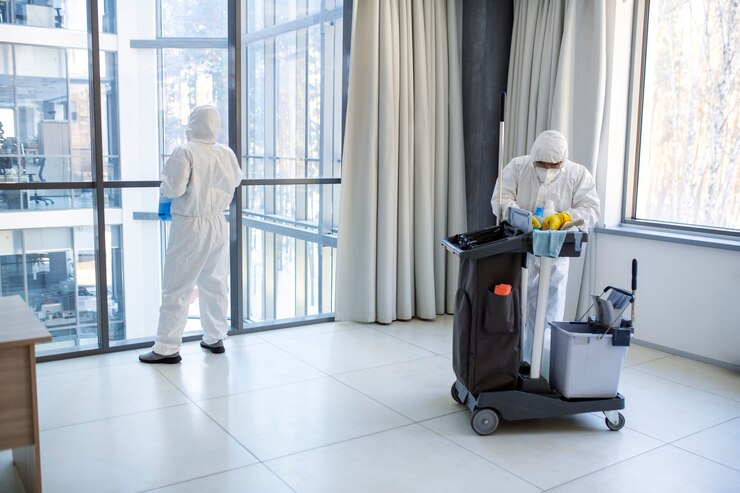Cleaning
Ensuring a Sterile Environment: The Importance of Professional Hospital Cleaning Services

Healthcare institutions are cornerstones for a healthy society, providing vital services that are relied upon daily. One fundamental aspect of healthcare that often goes unnoticed, yet is of critical importance, is the role of sanitation. Ensuring a sterile environment through professional cleaning services is crucial for the prevention of infections and for maintaining the health and safety of patients, staff, and visitors.
The Pillar of Healthcare Safety: Cleanliness
Cleanliness in hospitals is not just about aesthetics; it is a matter of life and death. Pathogens can easily proliferate in environments where the sick and wounded are treated, potentially leading to hospital-acquired infections (HAIs). These infections are dangerous complications that patients may contract while receiving medical treatment for other conditions. HAIs can result in extended hospital stays, increased medical costs, and in severe cases, can be fatal.
Professional hospital cleaning services are imperative to combat these risks. Such services ensure that all areas of a hospital are regularly and effectively disinfected. This involves specialised procedures that go beyond the scope of standard commercial cleaning, addressing areas that are often overlooked, yet can harbour dangerous microorganisms.
Why Professional Hospital Cleaning Matters
There are several reasons why hospitals should invest in professional cleaning services. Firstly, cleaning professionals working in the healthcare sector receive training specific to the challenges and standards of the industry. They are proficient in the best practices for disinfection and hygiene, using hospital-grade chemicals and equipment to ensure a thorough clean.
Secondly, a professional hospital cleaner is trained to handle biohazardous waste responsibly. This includes the proper disposal of items such as needles, bandages, and other materials that may be contaminated with blood or bodily fluids. The handling of such waste is not only crucial for patient and worker safety but is also regulated by health codes and standards which professionals are well-versed in maintaining.
Furthermore, professionals bring consistency to the cleaning process. Scheduled cleaning protocols are followed rigorously, with attention to frequently touched surfaces such as door handles, light switches, and elevator buttons, to name a few. This helps maintain an environment where transmission risks are minimised.
The Role of Hospital Cleaning in Patient Care
When patients visit a hospital, they are often at their most vulnerable. A sterile environment helps ensure that they can recover without the added risk of contracting an infection. Moreover, a clean hospital also plays a role in patient perception. Facilities that are noticeably clean can help put patients and their families at ease, which can be beneficial to the healing process.
In addition to the direct impact on patient health, hospital cleanliness is an integral part of healthcare regulation and accreditation. Regulatory bodies assess the cleanliness of healthcare institutions as part of their certification process. Failing to meet the necessary standards can have serious implications, including the loss of accreditation.
Overcoming Challenges in Hospital Sanitation
Hospitals present unique challenges for sanitation efforts due to their size, complexity, and the sheer volume of patient traffic. Not to mention, they operate 24/7, which requires cleaning services to be flexible and capable of working around the clock without interrupting medical services.
To address these challenges, professional cleaning services often use a team approach, where tasks are assigned based on speciality and urgency. This specialised task force works efficiently to maintain a rigorous standard of cleanliness, ensuring that even the busiest of hospitals can uphold the highest hygiene standards.
Measuring the Impact of Professional Cleaning Services
The effectiveness of hospital cleaning services can be gauged through several metrics. One clear indicator is the rate of HAIs within a facility. Lower infection rates are often a testament to a diligent cleaning regimen. Furthermore, compliance with health codes and successful healthcare inspections also point to the value professional cleaning services bring.
Environmental swabbing and the testing of surfaces for residual bioburden are other methods used to quantify cleanliness in a hospital setting. These metrics help establish benchmarks and identify areas for improvement in the cleaning and sanitation process.
Conclusion
In healthcare, the importance of maintaining a sterile environment cannot be overstated. It is a critical component that supports the well-being of patients and the effective functioning of healthcare practices. Professional hospital cleaning services are indispensable in achieving this goal. A proficient hospital cleaner brings expertise, thoroughness, and a keen awareness of the requirements in a healthcare context.
As the healthcare industry continues to evolve and new protocols are established in light of emerging pathogens, the role of hospital cleaning services will only grow in importance. Ensuring that these services keep pace with the demands of modern medicine is paramount, as is the commitment to the health and safety of all who enter the doors of a hospital.
Hospitals that recognise and invest in quality cleaning services are set apart, often seen as leaders in patient care and safety. It is indeed a responsibility that healthcare providers must embrace wholeheartedly, for the sake of their patients, staff, and the wider community.

Cleaning
Robot Pool Cleaner Timing: How Often Should I Run My Pool Cleaner?

The frequency of cleaning is not set in stone and can depend on many other factors.
A clean pool is a happy pool — and nothing cleans one with less effort than a robot pool cleaner. If you’re a new pool owner, or simply upgraded from a manual pool vacuum, knowing how often to run your cleaner can do wonders for your pool clarity, equipment lifespan, and your schedule.
From skimmer maintenance to employing a robotic pool cleaner, we’re breaking down the best maintenance schedule to get your pool crystal clear, and ready to swim.
How Often Should You Use A Robot Pool Cleaner?
The perfect frequency varies based on how often your pool is used and its surrounding location and environment.
Standard Recommendation:
During the regular swimming season, run your robot pool cleaner 2-3 times per week.
Daily Cleaning (Best When):
You have trees or other greenery that surround your pool.
After storms or high winds.
You’re combatting pollen, sand, or bugs on a regular basis.
The pool is heavily used on a daily basis.
Periodic Cleaning (1–2 Times Per Week):
Covered pools.
Pools not used daily.
In the off-season or during cooler months
Just remember this to all models of pool vacuum robot including popular models like Maytronics pool cleaner swimming pool robot vacuum cleaner of beatbot.
The Advantages of a Robot Pool Cleaner Scheduled
Establishing a regular schedule with your pool cleaning robot guarantees:
Less algae (yes, a pool robot will catch algae in the early stages).
Clean water recycles, so you don’t need to use as many chemicals.
Prevent stains of organic debris.
Cleaner with tools like for pool vacuum cleaner; Less manual labor
If cleaning a pool blooming with algae, use an algae pool vacuum or first brush the walls, turn on the cleaner, and then run the cleaner.
News in the Middle: Beatbot Innovations
Beatbot reigns supreme with the latest pool tech for consistent performance and automation:
Beatbot AquaSense 2 UltraCleaning: For deep, optimized, automatic cleaning.
Beatbot AquaSense 2 Pro: Perfect for climbing up the wall, high-efficiency filter and remote control.
Beatbot AquaSense 2 — a universal model for pools of any shape and dimension, schedule support
They are equipped with smart scheduling for automation of your pool cleaning process.
What about a booster pump for a pool?
What is a pool booster pump if you are using a pressure-side cleaner? Most robotic might not—they work independently of your pool’s pump system, which saves on energy and wear.
Final Words: Use a Robot Pool Cleaner to Keep Your Pool Spotless
And no doubt establishing a routine with your robot pool cleaner is one of the most effective approaches to keeping pool maintenance at a minimum while increase swim time. Using a pool vacuum robot, skimmer, or a more intelligent pool vacuum like the Beatbot AquaSense 2 Pro, staying consistent is the trick.
Robotic options take the work out of owning a pool — from fending off algae to avoiding the hassle of a pool booster pump. So run your cleaner two to three times weekly, adjust up or down for weather and usage, and revel in a sparkling clean pool each day.
-

 GENERAL2 years ago
GENERAL2 years agoDiscovering the Artistic Brilliance of Derpixon: A Deep Dive into their Animation and Illustration
-

 Posts2 years ago
Posts2 years agoSiegel, Cooper & Co.
-

 Lifestyle2 years ago
Lifestyle2 years agoPurenudism.com: Unveiling the Beauty of Naturist Lifestyle
-

 HEALTH2 years ago
HEALTH2 years agoTransformative Health Solutions: Unveiling the Breakthroughs of 10x Health
-

 FASHION2 years ago
FASHION2 years agoThe Many Faces of “λιβαισ”: A Comprehensive Guide to its Symbolism in Different Cultures
-

 Lifestyle2 years ago
Lifestyle2 years agoBaddieHub: Unleashing Confidence and Style in the Ultimate Gathering Spot for the Baddie Lifestyle
-

 Entertainment2 years ago
Entertainment2 years agoGeekzilla Podcast: Navigating the World of Pop Culture, Gaming, and Tech
-

 Lifestyle1 year ago
Lifestyle1 year agoSandra orlow: Unraveling the Story of an Iconic Figure